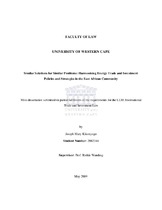| dc.description.abstract | Sustainable Energy (oil, gas and electricity) plays an important role in advancing productive capacity and increasing economic growth and sustainable development. In order to achieve this, there must be effective trade and investment in energy. Currently, there is relatively low regional and international trade in energy in the East African Community (EAC). Local and foreign direct investment flowing into the EAC is still very low in spite of a number of measures, such as, investment protection guarantees, that have been taken to improve investment. Each of the five countries in the EAC has its own energy policy, as well as a trade and investment policy and strategy. For some the policies are clearly stated; for others they are presumed. However, these policies are not effective. Without effective policies on trade and investment protection and promotion, the EAC will have minimum benefits in terms of terms of trade, investment inflows and sustainable economic development. The EAC is a customs union with an ultimate aim of attaining a political federation. Before this happens, there is need to have effective but also harmonised trade and investment policies and strategies. Adoption of comprehensive harmonised trade and investment policies and strategies shall provide a guideline to the Governments, the trade and investment agencies and other relevant stakeholders to follow in order to attain the ideals, objectives and spirit of the Community. This research, therefore, aims at proposing effective and harmonised trade and investment policies and strategies that Member States should pursue in order to develop the EAC into a viable integrated energy trade and investment zone. The study involves a review of the current policies, strategies, laws, regulations and practices in trade and investment in energy and a discussion of how the situation can be improved. The research raises many suggestions on conservation of energy as well as use of alternative sources . | en_US |

